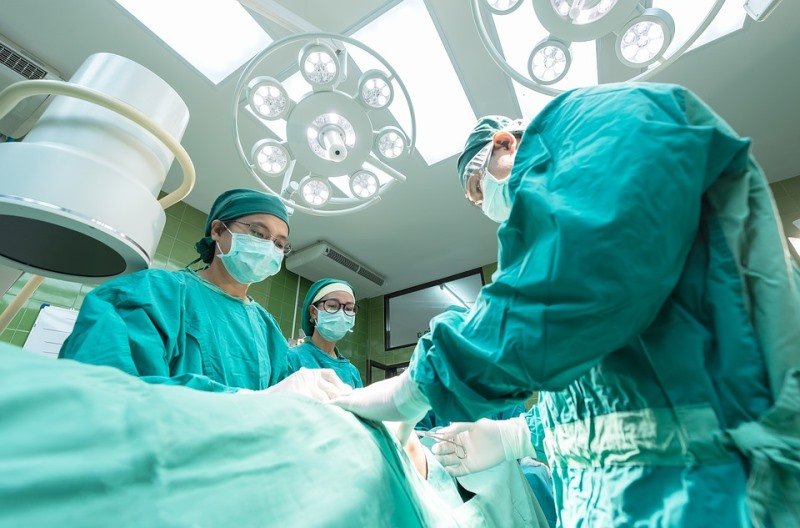Drugs with potential risk of drug shock during surgical anesthesia

Today, many people often experience allergic reactions to foods or drugs, these reactions are usually mild, causing only a rash on the skin. But in severe cases there is a risk of laryngospasm, difficulty breathing, fever, asthma, even anaphylaxis or death. This article introduces two cases shared by Dr. Professor Choi Shing Kwok at Cheng Hsin Hospital (Taipei - Taiwan) in the book 'The Truth of Anesthesia' published by Reading Times Taiwan.
Case 1: Anesthetized the man to cut the birthmark in the mouth, the results cannot be operated because the new anesthetic was shocked. After being treated by the hospital, the patient became a vegetative because of 'anaphylaxis after anesthesia'.
Case 2: A woman surnamed Chen from Yilan County (Yilan) went to a local beauty salon for a 'surgery to remove sweat' under her armpit. Unexpectedly, when the area was anesthetized, Ms. Chen suddenly convulsed and fell into a state of shock. Despite being urgently taken to a large hospital for emergency treatment, he was still in a state of delirium, even though his coma index was only 3. The cause was determined to be due to improper or excessive use of local anesthetics, And of course it can also be due to allergies…
The above two cases are very serious. Regarding these cases, Dr. Choi Shing Kwok emphasized that in the issue of drug-allergic shock during anesthesia, in addition to the rare cases of malignant hyperthermia due to hypersensitivity to anesthetics, the common cause is also topic of antibiotic use. Therefore, in many cases, drug-allergic shock during anesthesia cannot be completely attributed to the anesthetic.
According to the current monitoring and evaluation regulations of the hospital, prophylactic antibiotics must be given to patients 30 to 60 minutes before surgery to prevent post-operative infection, shorten hospital stay, and reduce costs. hospital stay. It can be said that the allergic reaction to antibiotics is much greater than to anesthetics.
There are statistics (not from Taiwan) showing that the rate of allergic reaction to Penicillin is 0.7 - 10%. In addition, according to the Taiwan 'Toxic Drug Relief Center' (TDRF), as of October 2017, there were 1,665 cases of drug-related relief with the payment amount exceeding NT$450 million. associated with serious problems such as death, disability and other serious illness. Of these cases, the antibiotic most likely to cause allergic reactions (including Penicillins, Cephalosporins cephalosporins, and Sulfonamides). In addition, drugs commonly used in surgery such as cefazolin and vancomycin are also drugs that can cause allergic reactions.
However, for patients who are allergic to antibiotics, during anesthesia, attention must be paid to handling allergic reactions to antibiotics, in addition to the safety of anesthetics. With today's technology, as long as surgical anesthesia is performed by a specialist anesthesiologist with the support of specialized monitoring machines, all allergic phenomena of the patient can be detected early, helping Doctors can give better treatment.
In general, drug allergies that result in a response that activates the body's immune system (IgE antibodies) are often 'unpredictable'. But during the pre-anesthesia exam, the anesthesiologist is bound to ask about the 'allergy history', which includes antibiotic allergies, once it is known which antibiotics the patient is allergic to. The doctor will change the antibiotic before surgery, this is very important.
Often in surgical operations, to be alert in case a patient is allergic to an antibiotic, most will use intravenous infusion – ie 'titration': first give a small dose to test, then that will give more appropriate dosage. This way to detect an allergic reaction to antibiotics early, when there are symptoms of an allergy, the doctor will find an alternative antibiotic. In Taiwan, any drug-induced allergic reaction, i.e. 'drug side effects', can be compensated by the 'Drug Injury Relief Fund' (TDRF – Taiwan) ).
- Video: Mechanism of action of three types of anesthesia in surgery
- Drug shock and precautions
- How to provide first aid to people who have drug shock
- Poisoning numbness - dangerous complications
- The elixir 'revived' the person who died from drug shock
- The magic drug can halve the risk of cancer death
- What happens to the body after kicking drugs?
- The unexpected reason makes the world scarce of drugs
- What is Narcan that can save Demi Lovato right in the hands of death due to drug shock?
- Wave of new generation of cancer treatment drugs
- Spinal anesthesia for pain relief can be difficult to breastfeed
- Vietnam has new drugs to help addicts crave for drugs
 13 causes of non-itchy rash
13 causes of non-itchy rash How the mouse with human ears changed the world?
How the mouse with human ears changed the world? The truth about 'fried rice syndrome!
The truth about 'fried rice syndrome! What is dental implant?
What is dental implant?